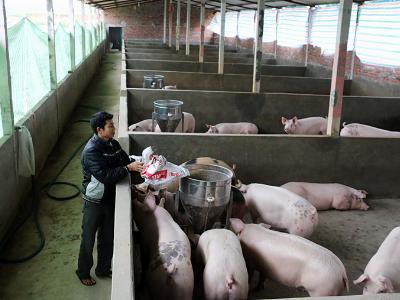Mekong Delta to create animal husbandry zones

“For a long time we have considered the strength of the delta as rice, seafood and fruit. The Ministry of Agriculture and Rural Development (MARD) and the delta have not paid much attention to husbandry development,” said MARD Deputy MinisterVũ Văn Tám.
Tám has assigned the MARD’s Animal Husbandry Department to work with Delta provinces on the zoning plan, which would identify drought and saline-prone areas and the kinds of animals that could be raised in the region.
Speaking at a seminar held in Cần Thơ City on Wednesday (June 1), Tám said the delta “has many advantages for animal husbandry development”.
The country’s largest rice, fruit and seafood producer has faced severe drought and salt water intrusion over the past five months, causing huge damages to rice, seafood and other crops.
The damages to animal husbandry have been low, as animal breeding is done on a small scale and is scattered throughout the delta. Breeders have also had good solutions to cope with drought and saltwater intrusion, according to Tám.
Besides traditional animals like pigs, cows, chicken and ducks, the delta could raise goats, rabbits, sheep and ducks, he said.
The kind of animals raised in different areas would depend on market demand and the specific characteristics of the region.
Based on the zoning plan, the MARD will ask the Government to provide funds and develop technical measures for animal husbandry development.
The delta has nearly 3.6 million pigs, accounting for 12.9 per cent of the country’s pigs, according to MARD’s Animal Husbandry Department. It also has more than 27,800 milch cows, accounting for 8.56 per cent of the country’s milch cows.
Nguyễn Văn Trọng, deputy head of the MARD’s Animal Husbandry Department, said Long An, Tiền Giang and Sóc Trăng provinces had the largest number of milch cows in the delta.
“The price of fresh milk is stable and milch cow breeding has yielded profits, so farmers have increased the cow herds,” he said.
Poultry breeding is also a strong point of the delta. The delta has more than 58.4 million poultry, accounting for 17.1 per cent of the country’s poultry, according to the MARD’s Animal Husbandry Department.
The delta leads the country in producing duck eggs, producing 1.33 million of duck eggs a year. It is the country’s only region exporting salted duck eggs, with exports of about 20 million salted duck eggs a year.
It also exports quail eggs to Japan, Singapore and the EU.
The delta has begun focusing on breeding animals that have high value such as swifts, honeybees and saline-water ducks, according to the MARD’s Animal Husbandry Department.
Raising ducks in salty water conditions
The Delta’s coastal provinces, including Cà Mau, Trà Vinh and Tiền Giang, have begun raising more saline-water ducks after a successful pilot programme.
Nguyễn Văn Tranh, deputy director of the Cà Mau Province Department of Agriculture and Rural Development, said the department had bred 2,800 saline-water ducks on a pilot basis with good results.
“According to initial results, this kind of duck can grow well in saline water areas and bring high and stable profits for farmers,” he said.
The ducks can drink saline water with a salt content of up to 15 per cent, while normal ducks cannot survive if drinking water has more than 4 per cent of salt.
Saline-water ducks can reach a weight of 2.5-3 kilo after three months of breeding. Female saline-water ducks can lay 240-250 eggs a year.
Nguyễn Hữu Tỉnh, deputy director of the Institute of Animal Sciences for Southern Việt Nam, said saline-water ducks grow well in saline and brackish water conditions without a loss of egg-laying capacity.
Saline-water ducks can also be bred in fresh-water areas, he said.
Phạm Văn Hai, who was one of the first two farmers to breed saline-water ducks on a pilot basis in Trà Vinh Province’s Cầu Ngang District last year, said he earned a profit of VNĐ40,000 (US$1.8) per duck after breeding them for four months.
Saline-water ducks are suitable for breeding in Cầu Ngang’s coastal areas, he said.
“Previously, I bred free-range ducks which are a local duck variety. I could not breed the duck variety in the dry season because saltwater intrusion occurred, leaving no fresh water in ponds,” he said.
Last year, the Trà Vinh Province Fisheries and Agriculture Extension Centre supported Hai and another farmer in Cầu Ngang District’s Mỹ Nam Long Commune to breed 500 saline-water ducks on a pilot basis.
After the success of the pilot project, the Trà Vinh Province Fisheries and Agriculture Extension Centre has encouraged local farmers in coastal areas to breed saline-water ducks in submerged forests and alluvial grounds.
State offers support
Prime Minister Nguyễn Xuân Phúc has decided to provide the delta with nearly VNĐ250 billion ($11.3 million) for the cost of preventing and controlling drought and saltwater intrusion.
Of the figure, VNĐ138 billion will be granted for the cost of electricity and oil and dredging canals and the rest for building dams, digging ponds and wells, transporting daily use water for households and fixing water supply facilities.
As of the end of April, drought and salt water intrusion had affected more than 200,000ha of paddy fields, 9,400ha of fruits and more than 220,000 households facing fresh water shortage, according to the MARD.
Nguyễn Hồng Khanh, deputy head of the Water Resource Directorate’s Irrigation Work Management Division, said the delta entering the rainy season and the increase of water flow from the Mekong River had significantly reduced the amount of saltwater at river mouths.
There is now enough fresh water for production and household daily use, he said.
Có thể bạn quan tâm
 Plan to protect rice crops from drought
Plan to protect rice crops from drought Disease outbreaks among crops could also occur, the Ministry of Agriculture and Rural Development said.